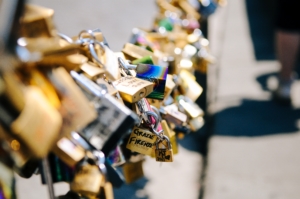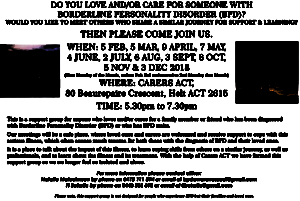Partner with BPD

BPD can create chaos and troubles in relationships, but given all these difficulties, people with BPD are frequently good, kind and caring individuals. Many people are drawn to a partner with BPD due to their intense emotions and a strong desire for intimacy that bring on a fun, exciting and passionate relationship.
If you are considering starting a relationship with someone with BPD, or are in one now, you need to educate yourself about the disorder, what to expect and the support you can access.
Affect of BPD symptoms
Abandonment sensitivity
People with BPD can be fearful of loneliness, however, this feeling can suddenly shift to being smothered and fearful of intimacy and can lead to withdrawal from a relationship. This leaves a relationship to fluctuate between high demand for love and attention and sudden withdrawal and isolate.
There is a fear of abandonment that lead those with BPD to constantly watch for signs that someone will leave them or interpret minor events as evidence of abandonment and rejection. These emotions may lead those with BPD to overreact and make frantic efforts to avoid the real or imagined abandonment.
Cycles of idealisation and devaluation
In a new relationship, people with BPD may initially idealise a person and throw themselves into a relationship fully without reservation. This honeymood period can be very exciting for new partner too. However, as reality sets and the person realises the partner is not faultless, there is an immediate switch to devaluing the person and suddenly the person is viewed as “all bad”. This stems from the difficulty with experiencing contradictory views of the world and others at the same time and having trouble recognising the fact that most people make mistakes even when they mean well. In response to devaluation, the person with BPD may have an outburst of anger, aggression or to break up. Hence, BPD romantic relationships are often described as intense and unstable.
Support
The key to maintaining a relationship with someone with BPD is to have a structure that includes letting the person know that they’re cared for as well as setting healthy boundaries. Encourage your BPD partner to seek professional help.
Even if a relationship is unhealthy, a person with BPD can often have trouble letting the relationship go. This is why it’s a good idea to have a support network for you and partner, especially if a break-up may occur, and this network often includes a mental health professional and/or therapist.
Check out Family Connections, a program throughout Australia including Canberra designed to offer education, skills training and support to family members of people with BPD.
BPD Awareness ACT holds monthly support group in the ACT on Mondays for loved ones of people with BPD. The support group is based on the principles of DBT to ensure the group is a safe, nonjudgmental and positive place in which to seek support and learning from others who share a similar journey. The aim of the group is to reduce isolation and discredit the stigma against those with BPD and their families. Click here for more details.
To maintain a calm and safe environment see Guidelines for loved ones of a person with BPD.
It’s important to remember that prognosis for BPD is good. Many people who are diagnosed with borderline personality disorder do not meet criteria for the disorder within just a few years. In the long term there is hope that your relationship with your loved one can work.
For more information
Very Well – Understanding romantic BPD relationships
Very Well – Borderline personality and marriage
Overcoming Borderline Personality Disorder: A Family Guide for Healing and Change
BPD Central – Why BPD relationships so complicated?
BPD Central – 10 essential limits for romantic relationships
BPD Family – When a partner, spouse or girlfriend has BPD
Sunrise – How to respond to someone with BPD
Carer insight
SANE Australia – Living with and loving someone with BPD
SANE Australia – Caring for someone with BPD: What it’s really like
The Mighty – Researching my wife’s BPD
Source
Very Well – Unstable interpersonal relationships and borderline personality
BPD Awareness ACT – Monthly support group in the ACT for loved ones of those with BPD
JOHN GUNDERSON – Corrective relationships
To watch more interview footage about BPD and love go to Borderliner Notes.



